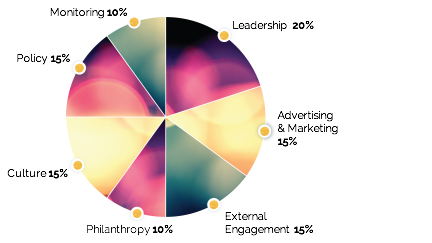As all successful middle market firms know, great businesses aren’t built on the strength of products and services alone. Operational efficiency, adaptability, marketing, and strong leadership are all necessary for success. Increasingly, companies of all sizes recognize that a diverse and inclusive workforce, and profile, is important as well, and in fact is quickly becoming a competitive imperative in the marketplace.
If that makes you sigh, because you’ve heard all you care to hear about diversity and inclusion – perhaps it feels squishy, overly politically correct, or like a distraction – you’re not alone.
That’s likely because, while the business case for diversity of any sort (from ethnic, to gender, to LGBT+) is well-established, a clear program for leveraging that promise is not. Managers know they should be supportive, and they often are, but they don’t always directly experience the benefit of diversity themselves.
Out Leadership, which is devoted to helping companies benefit from LGBT+ inclusion, decided to address that ambivalence and occasional confusion head-on, by creating a data-driven solution platform. OL-iQ is the first diagnostic tool companies can use to identify and act on discrete drivers of business impact related to LGBT+ inclusion. Why? As a certified B Corp, we help companies find their “return on equality,” and our work is predicated on tying LGBT+ inclusion directly to business improvement. LGBT+ inclusion can help drive business impact, but only as part of a coherent plan that emerges from a deeply informed diagnostic.
Managers often don’t know what to measure, beyond head count, which is unsustainable as a lone pillar of expanding diversity. Without understanding the opportunity holistically, their efforts can feel, and can be, random. Accountability and ownership of the process never take root. Without clear metrics and benchmarking, it’s difficult to engage leadership in building diversity, and creating a strategic path to leverage diversity to enhance company value.
While OL-iQ is the result of years of research and planning, it only takes about an hour to complete. Developed in partnership with Mathematica Policy Research, its results provide firms a private snapshot of how they perform against a variety of business metrics, in real time – a confidential dashboard they can use to identify areas of strength and opportunities for growth, with one goal: improving business performance.
(Companies of any size can take the survey here for free – raw scores and their explanations are private, and gratis.)

You can’t improve something until you identify the specific drivers. You can’t improve what you can’t measure. And you can’t leverage opportunity without knowing how it fits into the whole picture. Business leaders who helped us pilot OL-iQ said it makes a difference in their ability to connect LGBT+ inclusion and business planning. Jeff Formanek, Director of Structured Rates for RBC Capital Markets, said, “We found OL-iQ to be highly useful in helping us identify specific, data-driven, actionable opportunities to improve our performance around LGBT+ inclusion.”
The value of LGBT+ inclusion can’t be overstated. While the research historically has rarely been consistent, current estimates of the LGBT population in the U.S. range from 7% all the way up to 20% of millennials. At either end, that’s a huge talent pool. And it’s made even larger by the allies – those who support LGBT+ equality and are also attracted to firms and brands whose posture is aggressively pro-LGBT+ rights – who raise that talent pool by a significant factor. On the consumer side, the global LGBT+ market is now estimated to be $5.4T – nearly $1T in the U.S. alone, rivaling other minority groups.
We believe that every company, no matter how up-to-date its personnel policies are, can drive business results by gaining a deeper and more data-driven understanding of how their LGBT+ inclusion efforts are working. You can link directly to the survey here.